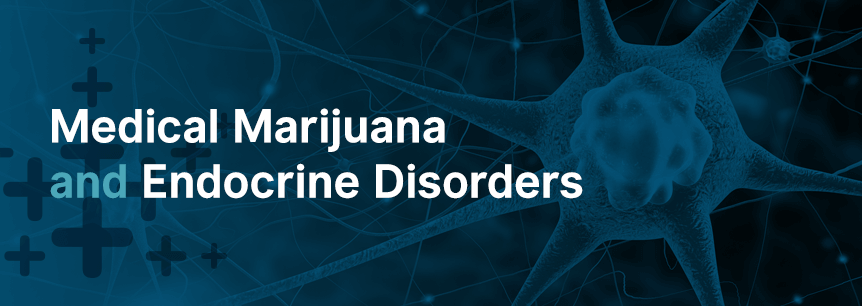
A healthy endocrine system controls hormones and helps to regulate many aspects of your body. When a problem exists in this system, however, you may experience a hormonal imbalance, which can cause symptoms including fatigue, issues with mood or sexual function and more. Endocrine disorders affect many people in the U.S. and across the world. Fortunately, marijuana can help counteract many of the common symptoms of endocrine disorders and has even been shown to have antitumor effects, making it a natural and effective treatment option.
The endocrine system includes all of the glands in your body that produce hormones. These glands include:
The hormones your endocrine glands produce are released into your bloodstream and travel throughout the body. Hormones play a significant role in regulating a person’s growth, organ function, metabolism, sexual function, and even mood. A healthy endocrine system can detect when certain hormones are needed to keep your body’s hormone levels balanced.
When one or more glands in your endocrine system doesn’t do its job correctly, it can cause a hormone imbalance. Since the endocrine system involves such a complex network of glands communicating with one another and each producing different hormones, numerous different things could go wrong. In some cases, it’s a disease, while in others, it’s a tumor putting pressure on the gland. Whatever the cause, when an issue exists that keeps your endocrine system from functioning correctly, you have an endocrine disorder.
By far, the most common endocrine disorder in the United States is diabetes. For someone who does not have diabetes, their pancreas produces the hormone insulin, which allows cells to process glucose. For people with type 1 diabetes, the pancreas doesn’t make any insulin, meaning they cannot process glucose at all on their own. People with type 2 diabetes do produce insulin, but their bodies don’t properly respond to it, resulting in glucose that remains in the blood rather than giving energy to cells.
After diabetes, the second most common endocrine disorder is thyroid disease, also called thyroid disorders. Your thyroid produces two important hormones — T3 and T4 — which help to regulate many aspects of how your body uses energy and oxygen. When your thyroid produces too much hormone, this is known as hyperthyroidism. When your thyroid is underactive, a more common problem, this is known as hypothyroidism.
Problems with the thyroid can be caused by different underlying issues, including the autoimmune disorders Hashimoto’s disease and Graves’ disease, thyroid cancer, toxic multinodular goiter, and thyroiditis. Overall, thyroid disorders are more common in women than in men.
Another common endocrine disorder is polycystic ovary syndrome (PCOS). As the name suggests, some women with PCOS have many tiny cysts on their ovaries, though not all do. The main issue that characterizes PCOS is a hormonal imbalance that involves excess levels of androgens and insulin in most cases.
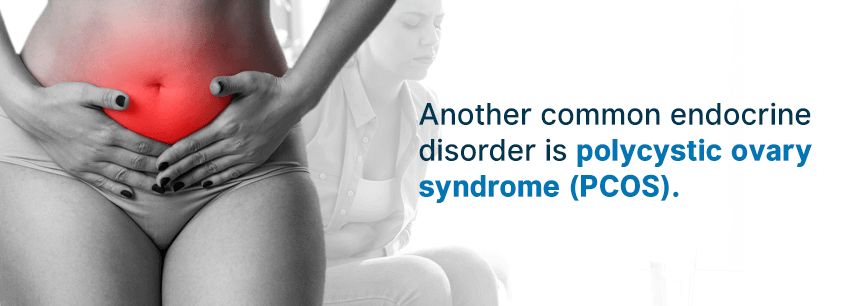
Aside from these three types of endocrine disorders, some other endocrine disorders include:
Let’s take a look at some statistics that demonstrate the prevalence of the most common endocrine disorders in the U.S.:
Endocrine disorders vary widely and, therefore, so do the symptoms they cause. However, there is one symptom common to most endocrine disorders — fatigue. A person’s mental state is often also affected by an endocrine disorder, making depression, anxiety and mood swings common symptoms, as well. If the endocrine disorder affects a sex hormone, then you can expect changes in sexual function, which might include issues with libido, infertility, irregular menstruation, erectile dysfunction and more.

Let’s look more specifically at some common symptoms for diabetes since it is the most common type of endocrine disorder:
Symptoms of hyperthyroidism include:
Hypothyroidism commonly causes:
Common symptoms of PCOS include:
Treating an endocrine disorder depends on the exact condition you have. Here are a few common methods of treatment that those with endocrine disorders may undergo:
If you have a tumor or nodules that are affecting the function of one of your glands, surgery may be necessary to remove the growth. In most cases, tumors that develop on your glands are benign, or noncancerous, but if the tumor is cancerous, you may also need to go through additional forms of cancer treatment, including chemotherapy and radiation. Surgery tends to involve an uncomfortable recovery process where the patient must take pain medications, either over-the-counter or prescribed, to cope with the pain as their body heals.
Medications can be used to help manipulate and balance your hormone levels if they are off-balance. If your disorder causes insufficient hormone production, you can supplement by taking a synthetic or animal version of the hormone. For example, people with hypothyroidism are usually prescribed pills which replace their missing thyroid hormone. If someone has hyperthyroidism, an antithyroid agent medication can help by suppressing the thyroid’s hormone production.
People with diabetes, especially those with type 1 diabetes or those who have had type 2 diabetes for a long time, may take insulin to make up for their lack of insulin production. Insulin can be injected or inhaled as a powder. It can cause low blood sugar, swollen arms and legs, and weight gain.
For women with endocrine disorders that affect their sex hormones, like PCOS, a gynecologist may prescribe birth control to help regulate their periods and balance hormones to a degree. Birth control has some unfortunate side effects for some women, however, including decreased libido, nausea, breast tenderness, weight gain, headaches, mood changes and more.
Natural supplements may also be able to help balance hormones, though they won’t be able to replace hormones your body isn’t producing. These supplements come in pills, tablets, powders, and teas and include vitamin B, magnesium, vitamin D-3, omega-3, probiotics and more.
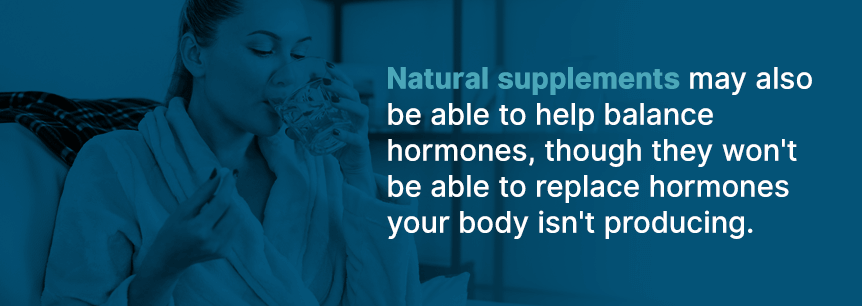
Lifestyle changes can also help. Some of these changes include getting plenty of exercise, eating a healthy diet that has enough protein and is low in sugar and carbohydrates, monitoring alcohol intake, quitting smoking and managing stress. Some people find yoga or meditation practices helpful for relaxation, while others may benefit from making time to enjoy their favorite hobbies.
Anyone dealing with an endocrine disorder should evaluate medical marijuana as a viable treatment option. Some patients may choose to use pot in addition to conventional methods of treatment. Why should you consider medical marijuana?
There are two main reasons marijuana can help people with endocrine disorders. One is that marijuana can help stunt the growth of tumors, and the other is that marijuana can provide relief for many of the symptoms of endocrine disorders.
Let’s start with that first reason. Remember that some endocrine disorders are caused by tumors, either benign or cancerous, that inhibit a gland’s ability to do its job correctly. Research published in the Endocrine-Related Cancer journal found that endocannabinoids, molecules that activate cannabinoid receptors in our body, are capable of inhibiting cell growth, invasion, and metastasis of breast, thyroid and prostate tumors. Marijuana activates cannabinoid receptors in the same way that naturally-occurring endocannabinoids in your body do. This indicates that marijuana is likely to have an antitumor effect.
This isn’t an isolated finding, either. Other studies have confirmed and expanded our understanding of marijuana’s anti-tumor properties. For example, research done in 2014 looked specifically at this issue and revealed that tetrahydrocannabinol (THC) in particular, a chemical compound in marijuana, can shrink tumors.
While research on marijuana’s effects on the endocannabinoid system is more preliminary, marijuana has some effects which can be felt immediately by those who use it. Countless marijuana users have experienced these positive effects firsthand. Of special interest to people who have endocrine disorders is marijuana’s ability to energize, relax, improve mood and induce sleep. These well-known effects of marijuana directly combat common symptoms of endocrine disorders, such as fatigue, pain, nervousness, insomnia, irritability, mood swings, and depression.
Even when taken in appropriate doses, which a doctor can help you determine, marijuana has few potentially negative side effects. If you experience specific side effects that interfere with your daily life, ask your doctor about adjusting your dosage or trying a different strain. Cannabis can cause:
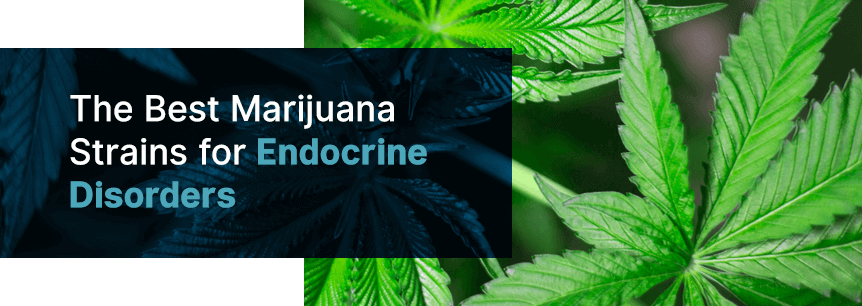
There are nearly limitless possibilities for strains to try. Different strains will affect you differently, so if you don’t like one, try another. In general, Indica strains have a relaxing effect, while Sativa strains have an energizing effect. Another thing to consider is that strains higher in THC have a more powerful psychoactive effect. Because different strains have different effects, you may want to try certain strains during the day or when you need to be out and about and other strains when you can stay at home or are trying to sleep at night.
Here are a few strains that are likely to be good choices for those with endocrine disorders:
You can administer marijuana in a variety of ways, including:
If you suffer from an endocrine disorder, marijuana may be able to help relieve your symptoms. If your problem is due to a tumor or tumors, then marijuana may be able to help shrink these tumors. If you’re interested in trying medical marijuana, you can get started by searching for a medical marijuana doctor or a dispensary near you.
At MarijuanaDoctors.com, we make sure all of our recommended doctors have both the proper licensure and the experience to provide you with expert help for using marijuana medicinally. Talk to your marijuana doctor about your lifestyle and what symptoms you’re seeking relief from. Make sure you follow up with your doctor to ensure that you find the best treatment plan for you. Don’t settle for a strain or dosage you aren’t thrilled with.
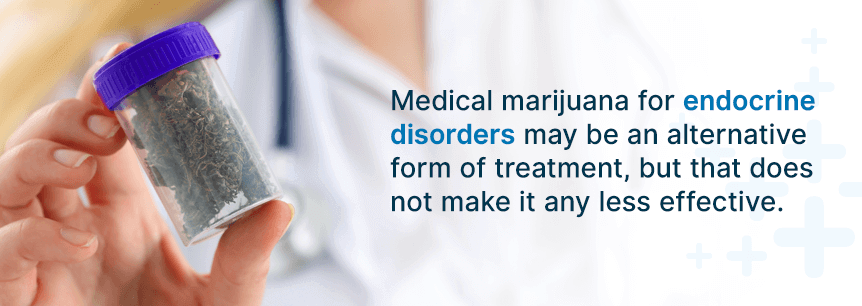
Medical marijuana for endocrine disorders may be an alternative form of treatment, but that does not make it any less effective. Get started on your journey to natural healing and relief today!
Find A Doctor Find A Dispensary


Please allow us to access your location to find local dispensaries.
VIEW ALL DISPENSARIES ➔